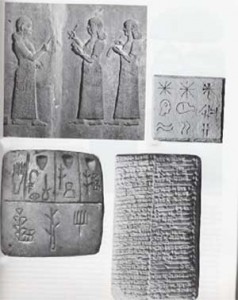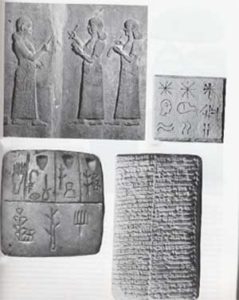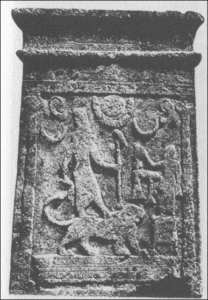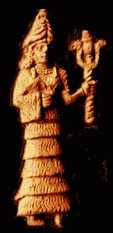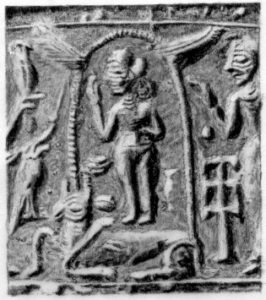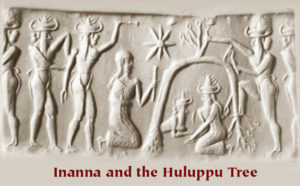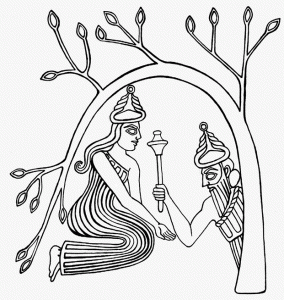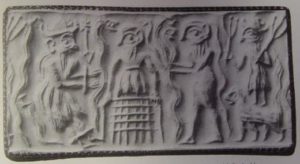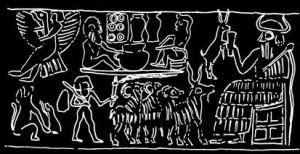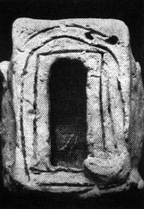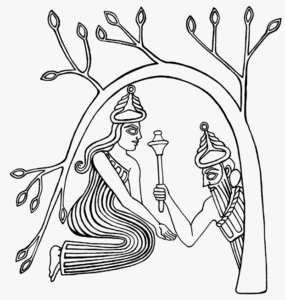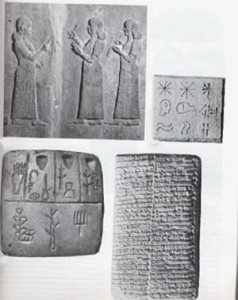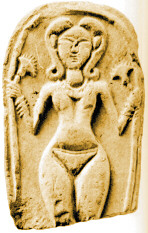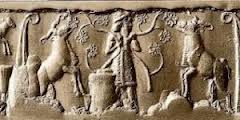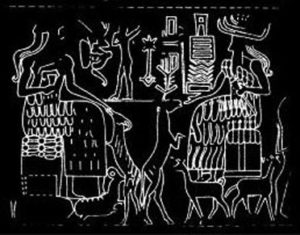The Electronic Text Corpus of Sumerian Literature
(Texts: All Artifacts, Color Coding, & Writings in Bold Type With Italics Inside Parenthesis, are Added by Editor R. Brown, not the Authors, Translators, or Publishers!)
(gods in blue)
1-4. His heart was full of tears as he went out into the countryside.
The lad’s heart was full of tears as he went out into the countryside.
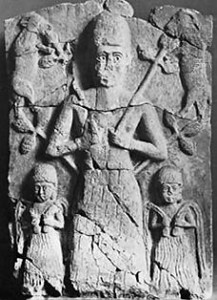 (Dumuzi the Shepherd, son to Enki & Ninsun)
(Dumuzi the Shepherd, son to Enki & Ninsun)
Dumuzid‘s heart was full of tears as he went out into the countryside.
He carried with him his {(1 ms. adds:) shepherd’s} stick on his shoulder, sobbing all the time:
5-14. “Grieve, grieve, o countryside, grieve!
O countryside, grieve! O marshes, cry out!
O …… crabs of the river, grieve!
O frogs of the river, cry out!
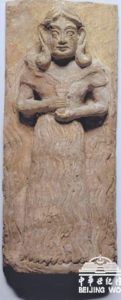 (Ninsun, mother to Dumuzi, Gishtinanna, & many semi-divines appointed to kingships)
(Ninsun, mother to Dumuzi, Gishtinanna, & many semi-divines appointed to kingships)
My mother will call to me, my mother, my Durtur (Ninsun), will call to me,
my mother will call to me for five things, my mother will call to me for ten things:
if she does not know the day when I am dead, you, o countryside, can inform my mother who bore me.
Like my little sister may you weep for me.”
5-18. In ancient times he lay down, in ancient times he lay down, in ancient times the shepherd lay down.
When in ancient times the shepherd lay down, he lay down to dream.
He woke up — it was a dream!
He shivered — it was sleep!
He rubbed his eyes, he was terrified.
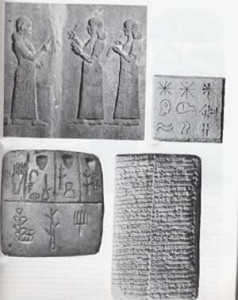 (giant female goddesses as scribe, teachers, medical care, dancers, singers of songs, etc., etc.)
(giant female goddesses as scribe, teachers, medical care, dancers, singers of songs, etc., etc.)
19-24. “Bring, bring, bring my sister!
Bring my G̃eštin-ana (Geshtinanna), bring my sister!
Bring my scribe proficient in tablets, bring my sister!
Bring my singer expert in songs, bring my singer!
Bring my perspicacious girl, bring my sister!
Bring my wise woman, who knows the meanings of dreams, bring my sister!
I will relate the dream to her.”
25-39. “A dream, my sister! A dream!
In my dream, rushes were rising up for me, rushes kept growing for me,
a single reed was shaking its head at me; twin reeds — one was being separated from me.
Tall trees in the forest were rising up together over me.
Water was poured over my holy {coals} {(1 ms. has instead:) brazier} for me, the cover of my holy churn was being removed,
my holy drinking cup was torn down from the peg where it hung, my shepherd’s stick disappeared from me.
An owl (?) took a lamb from the sheep house, a falcon caught a sparrow on the reed fence,
my male goats were dragging their dark beards in the dust for me, my rams were scratching the earth with their thick legs for me.
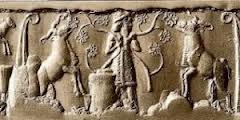 (Dumuzi & stags, herding in the mountains)
(Dumuzi & stags, herding in the mountains)
The churns were lying on their side, no milk was poured, the drinking cups were lying on their side,
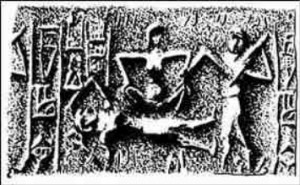 (Dumuzi‘s deceased water-damaged body discovered)
(Dumuzi‘s deceased water-damaged body discovered)
Dumuzid (Dumuzi) was dead, the sheepfold was haunted.”
41-55. G̃eštin-ana answered Dumuzid:
“My brother, your dream is not favorable, don’t tell me any more of it!
Dumuzid, your dream is not favorable, don’t tell me any more of it!
The rushes rising up for you, which kept growing for you, are bandits rising against you from their ambush.
The single reed shaking its head at you is your mother who bore you, shaking her head for you.
The twin reeds of which one was being separated from you is you and I — one will be separated from you.
The tall trees in the forest rising up together over you are the evil men catching you within the walls.
That water was poured over your holy coals means the sheepfold will become a house of silence.
That the cover of your holy churn was being removed for you means the evil man will bring it inside in his hands.”
56-69. “Your holy drinking cup being torn down from the peg where it hung is you falling off the lap of the mother who bore you.
That your shepherd’s stick disappeared from you means the demons {will set fire to it} {(1 ms. has instead:) will smash it}.
The owl (?) taking a lamb from the sheep house {is the evil man who will hit you on the cheek}
{(1 ms. has instead:) is the evil man who will destroy the sheep house}.
The falcon catching a sparrow on the reed fence is the big demon coming {down}
{(1 ms. has instead:) out} from the sheep house.
That the churns were lying on their sides, no milk was poured,
the drinking cups were lying on their sides, that Dumuzid was dead, and the sheepfold haunted,

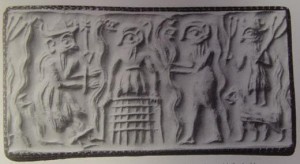
(Dumuzi bound hand & feet; Dumuzi, earliest “modern earthling male & female, & Dumuzi the Shepherd)”
means your hands will be bound in handcuffs, your arms will be bound in fetters.
That your male goats were dragging their dark beards in the dust for you
means that my hair will whirl around in the air like a hurricane for you.
That your rams were scratching the earth with their thick legs for you
means that I shall lacerate my cheeks with my fingernails for you as if with a boxwood needle.”
70-82. Hardly had she spoken these words when he said,
“Sister, go up onto the mound, sister, go up onto the mound!
Sister, when you go up onto the mound, do not go up onto the mound like an ordinary person,
but lacerate {your heart} {(1 ms. has instead:) your hair} and your liver,
lacerate your clothes and your crotch, sister, and then go up onto the mound!
Sister, when you go up onto the mound, look out from onto the mound!
The evil ……, hated by men, …… a river barge!
They hold in their hands the wood to bind the hands,
they are identified (?) from the wood to bind the neck — no man knows how to undo it!”
83-86. Ama-g̃eštin-ana (Geshtinanna) went up onto the mound and looked around, G̃eštin-ana craned her neck.
Her girl friend G̃eštin-dudu (unidentified?) advised her:
“The big men who bind the neck are already coming for him, they are …… coming for him!'”
87-90.
“My adviser and girl friend! Are they coming?”
“Yes, I will point out to you those who bind the neck!”
“My brother, your demons are coming for you!
Duck down your head in the grass!
Dumuzid, your demons are coming for you!
Duck down your head in the grass!”
91-94. “My sister, I will duck down my head in the grass!
Don’t reveal my whereabouts to them!
I will duck down my head in the short grass!
Don’t reveal my whereabouts to them!
I will duck down my head in the tall grass!
Don’t reveal my whereabouts to them!
I will drop down into the ditches of Arali!
Don’t reveal my whereabouts to them!”
95-97. “If I reveal your whereabouts to them, may your dog devour me!
The black dog, your shepherd dog, the noble dog, your lordly dog, may your dog devour me!”
98-102. She remembered (?): “…… give your friend instructions about it!
O my brother, may you never have a friend or comrade like ……!
After the demons (?) have searched for you, ……, if he tells you …….”
103-106. “My friend, I will duck down my head in the grass!
Don’t reveal my whereabouts to them!
I will duck down my head in the short grass!
Don’t reveal my whereabouts to them!
I will duck down my head in the tall grass!
Don’t reveal my whereabouts to them!
I will drop down into the ditches of Arali!
Don’t reveal my whereabouts to them!”
107-109. “If I reveal your whereabouts to them, may your dog devour me!
The black dog, your shepherd dog, the noble dog, your lordly dog, may your dog devour me!”
110-138. Those who came for the king are a motley crew, who know not food, who know not drink, who eat no sprinkled flour,
who drink no poured water, who accept no pleasant gifts, who do not enjoy a wife’s embraces,
who never kiss dear little children, who never chew sharp-tasting garlic, who eat no fish, who eat no leeks.
There were two men of Adab who came for the king.
They were thistles in dried-up waters, they were thorns in stinking waters –
‘his hand was on the table, his tongue was in the palace’ (Alludes to a proverb) .
Then there were two men of Akšak who came for the king, with …… carried on their shoulders.
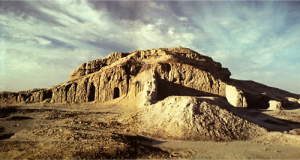
(giant alien gods King Anu’s, when visiting Earth, & Inanna‘s mud-brick-built ziggurat temple residence in Uruk)
Then there were two men of Unug (Uruk) who came for the king.
With head-smashing clubs tied to their waists, there were two men of Urim (Ur) who came for the king.
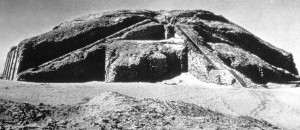
(Nannar‘s & spouse Ningal‘s mud-brick-built ziggurat temple residence in Ur, city of Biblical Abraham & family, with Stairway to Heaven)
With {shining} {(1 ms. has instead:) clean} clothes on the quayside, there were two men of Nibru who came for the king.
Crying “Man run after man!”, they came to the sheepfold and cow-pen.
They caught G̃eštin-ana at the sheepfold and cow-pen.
They offered a river of water, but she wouldn’t accept it.
They offered her a field of grain, but she wouldn’t accept it.
The little demon spoke to the big demon, the wise demon, the lively demon,
and the big demon who was between them, wise like …… destroying a ……, like …… barring a ……, they spoke:
139-150. “Who since the most ancient times has ever known a sister reveal a brother’s whereabouts?
Come! Let us go to his friend!”
Then they offered his friend a river of water, and he accepted it.
They offered him a field of grain, and he accepted it.
“My friend ducked down his head in the grass, but I don’t know his whereabouts {(1 ms. adds:)
Dumuzid ducked down his head in the grass, but I don’t know his whereabouts}”.
They looked for Dumuzid‘s head in the grass, but they couldn’t find him.
“He ducked down his head in the short grass, but I don’t know his whereabouts”.
They looked for Dumuzid‘s head in the short grass, but they couldn’t find him.
“He ducked down his head in the tall grass, but I don’t know his whereabouts”.
They looked for Dumuzid‘s head in the tall grass, but they couldn’t find him.
“He has dropped down into the ditches of Arali, but I don’t know his whereabouts”.
151-155.They caught Dumuzid in the ditches of Arali.
Dumuzid began to weep and was tear-stricken: “In the city my sister saved my life, my friend caused my death.
If a sister leaves (?) a child in the street, someone should kiss it.
But if a friend leaves (?) a child in the street, no one should kiss it.”
156-164. The men surrounded him and drained the standing waters.
They twisted a cord for him, they knotted a net for him.
They wove a reed hawser for him, they cut sticks for him.
The one in front of him threw missiles at him, the one behind him …… one cubit.
 (captured Dumuzi, bound hands & feet, pleads for help)
(captured Dumuzi, bound hands & feet, pleads for help)
His hands were bound in handcuffs, his arms were bound in fetters.
The lad raised his hands heavenward to Utu:
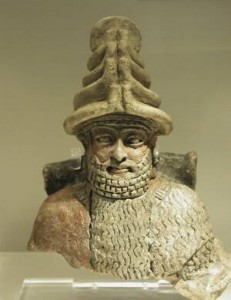 (Utu, twin brother to Dumuzi‘s spouse Inanna)
(Utu, twin brother to Dumuzi‘s spouse Inanna)
165-173. “Utu, you are my brother-in-law, I am your sister’s husband!
I am he who carries food to E-ana (ziggurat residence), I am he who brought the wedding gifts to Unug (Uruk),
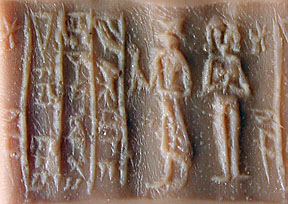 (Dumuzi & his young spouse Inanna, Goddess of Love)
(Dumuzi & his young spouse Inanna, Goddess of Love)
I am he who kisses the holy lips, I am he who dances on the holy knees, the knees of Inanna.
Please change my hands into gazelle hands, change my feet into gazelle feet, so I can evade my demons.
Let me escape with my life to Ku-bireš-dildareš.”
174-180. Utu accepted his tears {(1 ms. adds:) as a gift}.
Like a merciful man he showed him mercy.
He changed his hands into gazelle hands, he changed his feet into gazelle feet,
and so he evaded the demons, and escaped with his life to Ku-bireš-dildareš.
The demons searched for him, but didn’t find him.
181-191. “Come, let us go to Ku-bireš.” {(1 ms. adds:) …… like a net …….}
They caught Dumuzid at Ku-bireš.
The men surrounded him and drained the standing waters.
They twisted a cord for him, they knotted a net for him.
They wove a reed hawser for him, they cut sticks for him,
the one in front of him threw missiles at him, the one behind him …….
 (Dumuzi‘s cuffed hands & feet)
(Dumuzi‘s cuffed hands & feet)
His hands were bound in handcuffs, his arms were bound in fetters.
The lad raised his hands heavenward to Utu:
192-199. “Utu, you are my brother-in-law, I am your sister’s husband!
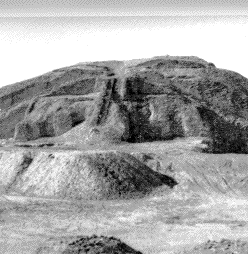 (house of giant alien gods in Uruk, & other cities, with their launch & landing site on tops of ziggurats, far away from the earthlings living in the cities way below them)
(house of giant alien gods in Uruk, & other cities, with their launch & landing site on tops of ziggurats, far away from the earthlings living in the cities way below them)
I am he who carries food to E-ana (Anu‘s temple in Uruk), I am he who brought the wedding gifts to Unug (Uruk),
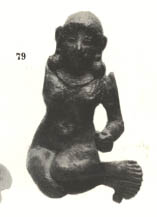 (Inanna, daughter to Nannar & Ningal, attractive young spouse to Dumuzi)
(Inanna, daughter to Nannar & Ningal, attractive young spouse to Dumuzi)
I am he who kisses the holy lips, I am he who dances on the holy knees, the knees of Inana.
Please change my hands into {gazelle} {(1 ms. has instead:) snake} hands, change my feet into {gazelle}
{(1 ms. has instead:) snake} feet, so I can escape to the house of Old Woman Belili.”
200-205. Utu accepted his tears.
He changed his hands into {gazelle} {(1 ms. has instead:) snake} hands,
he changed his feet into {gazelle} {(1 ms. has instead:) snake} feet,
so he evaded the demons and escaped with his life to the house of Old Woman Belili.
He approached the house of Old Woman Belili.
206-208. “Old woman! I am not just a man, I am the husband of a goddess!
Would you pour water — please — so I can drink water.
Would you sprinkle flour — please — so I can eat flour.”
209-212. She poured water, and she sprinkled flour, and he sat down inside the house.
The old woman left the house.
When the old woman left the house, the demons saw her.
213-226. “Unless the old woman is aware of Dumuzid‘s whereabouts, she is indeed looking frightened!
She is indeed screaming in a frightened way!
Come, let us go to the house of Old Woman Belili!”
They caught Dumuzid at the house of Old Woman Belili.
The men surrounded him and drained the standing waters.
They twisted a cord for him, they knotted a net for him.
 (Dumuzi, Biblical “Adam“, “Eve“, & Dumuzi the Shepherd)
(Dumuzi, Biblical “Adam“, “Eve“, & Dumuzi the Shepherd)
They wove a reed hawser for him, they cut sticks for him, the one in front of him threw missiles at him, the one behind him …….
His hands were bound in handcuffs, his arms were bound in fetters.
The lad raised his hands heavenward to Utu:
227-234. “Utu, you are my brother-in-law, I am your sister’s (Inanna) husband!
I am he who carries food to E-ana (Anu’s temple residence in Uruk)
I am he who brought the wedding gifts to Unug, I am he who kisses the holy lips,
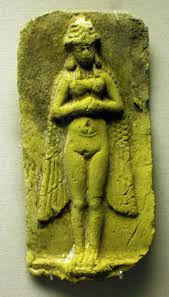
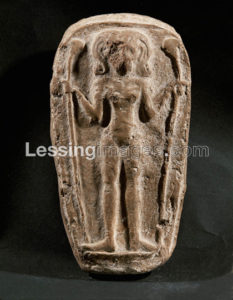 (powerful Goddess of Love, Inanna)
(powerful Goddess of Love, Inanna)
I am he who dances on the holy knees, the knees of Inanna.
Please change my hands into gazelle hands, change my feet into gazelle feet, so I can escape to the holy sheepfold, my sister’s sheepfold.”
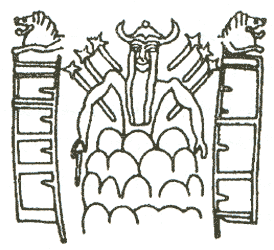
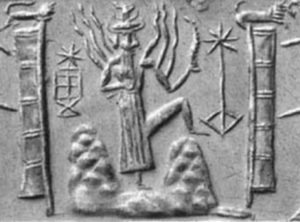 (Utu, Commander of the mountain launch & landing sites)
(Utu, Commander of the mountain launch & landing sites)
235-244. Utu accepted his tears.
He changed his hands into {gazelle} {(1 ms. has instead:) snake} hands,
he changed his feet into {gazelle} {(1 ms. has instead:) snake} feet, so he evaded the demons,
and escaped with his life to the holy sheepfold, his sister’s sheepfold.
He approached the holy sheepfold, his sister’s sheepfold.
G̃eštin-ana cried toward heaven, cried toward earth.
Her cries covered the horizon completely like a cloth, they were spread out like linen.
She lacerated her eyes, she lacerated her face, she lacerated her ears in public;
in private she lacerated her buttocks.
245-255. “My brother, I will go round in the streets …….”
(The demons said:)
“Unless G̃eštin-ana is aware of Dumuzid‘s whereabouts, she is indeed looking frightened!
She is indeed screaming in a frightened way!
Come, let us go to the sheepfold and cow-pen!”
When the first demon entered the sheepfold and cow-pen, {he set fire to the bolt} {(1 ms. has instead:) he shouted ……}.
When the second entered the sheepfold and cow-pen, he set fire to the shepherd’s stick.
When the third entered the sheepfold and cow-pen, he removed the cover of the holy churn.
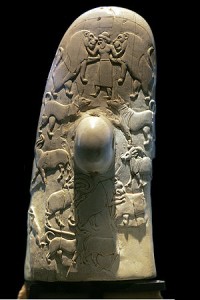
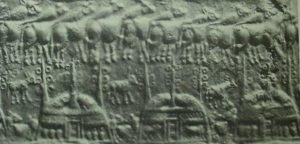 (alien cow pens of Nannar in Ur, feeding Sumer)
(alien cow pens of Nannar in Ur, feeding Sumer)
256-260. {When the fourth entered the sheepfold and cow-pen, he tore down the drinking cup from the peg where it hung.
When the fifth entered the sheepfold and cow-pen, the churns lay on their side, no milk was poured,
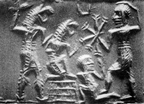 (demons attack & kill giant alien god Dumuzi, Marduk is blamed by Inanna)
(demons attack & kill giant alien god Dumuzi, Marduk is blamed by Inanna)
the drinking cups lay on their side, Dumuzid was dead, the sheepfold was haunted.}
{(instead of lines 256-260, 1 ms. has:)
When the fourth entered the sheepfold and cow-pen, he poured water on my holy brazier.
When the fifth demon entered the sheepfold and cow-pen, he tore down my holy drinking cup from the peg where it hung.
When the sixth demon entered the sheepfold and cow-pen, the churns lay on their side, and no milk was poured.
When the seventh demon entered the sheepfold and cow-pen,
the drinking cups lay on their side, Dumuzid was dead, the sheepfold was haunted.}
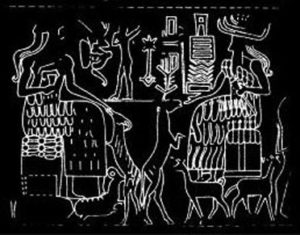 (young lovers Inanna, & spouse Dumuzi the Shepherd)
(young lovers Inanna, & spouse Dumuzi the Shepherd)
261-999. A šir-kalkal for the dead Dumuzid.
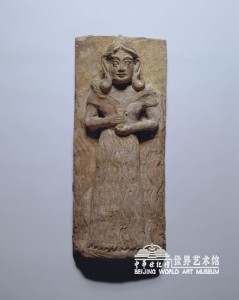 (Ninsun, mother of many mixed-breeds made into kings)
(Ninsun, mother of many mixed-breeds made into kings) 